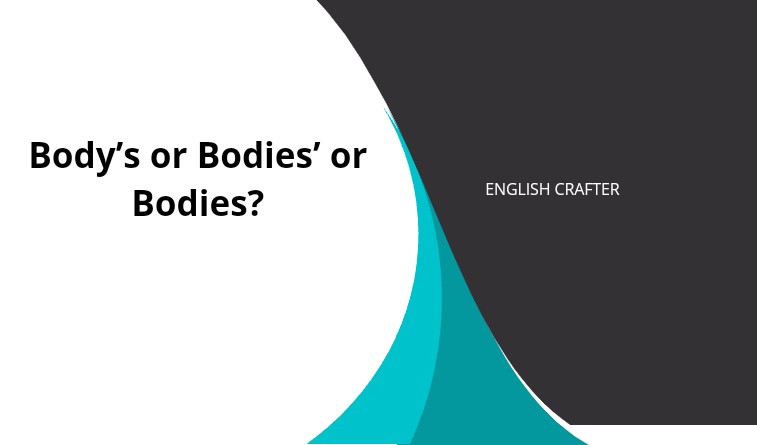Body’s or Bodies’ or Bodies?


The word body’s is the singular possessive version of body. For example, “The body’s natural response to stress includes increased heart rate.” Conversely, bodies’ is the plural possessive. For instance, “The athletes’ bodies’ endurance impressed the coaches.” Additionally, the word bodies is the standard plural form of body.
The following chart illustrates the different versions of the word body.
| Form | Example |
| Singular | Body |
| Plural | Bodies |
| Singular possessive | Body’s |
| Plural Possessive | Bodies’ |
Here are some examples of the four forms in context:
Singular: The human body is a complex system comprising various organs and tissues.
Plural: The bodies of water in the region support diverse ecosystems.
Singular possessive: The body’s ability to heal itself is remarkable.
Plural possessive: The dancers’ bodies’ movements were synchronized and graceful.
The possessive examples above show us the differences between a single body and multiple bodies possessing attributes or characteristics.
When you are referring to something owned or possessed by multiple bodies you need to use the plural possessive form.
For more insights on the possessive forms and to avoid making mistakes in the future, please continue reading the rest of this article.
Body’s
The term body’s is the singular possessive form of body. Therefore use this form when you are talking about or referring to something that is owned by a singular body.
This form can also be used to to describe various aspects associated with the body’s anatomy or functions, as illustrated in these examples:
- The body’s natural defenses protect against infections and illnesses.
- Her body’s flexibility enables her to perform intricate yoga poses.
- The body’s metabolism plays an important role in energy regulation.
Let’s break there, I don’t want to get into science 😀
That said,, the singular possessive can also be used to to highlight non-physical traits or characteristics of a body:
- The body’s resilience and adaptability are essential for survival in challenging environments.
- His body’s language conveyed confidence and authority.
- The body’s response to external stimuli varies from person to person.
In addition, the term body’s can also be used to signify events or experiences associated with a single body:
- The body’s relaxation techniques promote stress relief and mental well-being.
- A healthy diet and regular exercise contribute to the body’s overall fitness.
- The body’s reaction to certain medications may vary depending on individual factors.
Bodies’
The term bodies’ is the plural possessive version of body. Therefore, it is used to indicate that multiple bodies possess or own something.
The plural possessive can be used in various contexts encompassing bodies of diverse groups of people. Here are examples illustrating this:
- The athletes’ bodies’ strength and agility are honed through rigorous training.
- The soldiers’ bodies’ endurance is tested during long marches and missions.
- The dancers’ bodies’ movements are coordinated and synchronized with precision.
Furthermore, the plural possessive can be utilized to indicate possessions or attributes shared among multiple bodies:
- The patients’ bodies’ responses to treatment vary depending on the severity of their conditions.
- The students’ bodies’ engagement in extracurricular activities enhances their overall well-being.
- The performers’ bodies’ flexibility and coordination are showcased in their routines.
In addition, when referring to locations or events involving multiple bodies, the term bodies’ can be employed:
- The bodies of water in the region provide habitat for diverse aquatic species.
- The gym is equipped with state-of-the-art facilities to help individuals strengthen their bodies.
- The bodies recovered from the wreckage were identified through forensic analysis.
Moreover, bodies can also be used to refer to all bodies collectively:
- Bodies undergo physiological changes as they age.
- The artist explores themes of mortality and identity through depictions of human bodies.
- Bodies of knowledge in various fields contribute to our understanding of the world.






